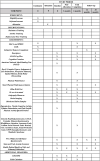Reshaping the path of mild cognitive impairment by refining exercise prescription: a study protocol of a randomized controlled trial to understand the "what," "for whom," and "how" of exercise to promote cognitive function
- PMID: 36085237
- PMCID: PMC9462619
- DOI: 10.1186/s13063-022-06699-7
Reshaping the path of mild cognitive impairment by refining exercise prescription: a study protocol of a randomized controlled trial to understand the "what," "for whom," and "how" of exercise to promote cognitive function
Abstract
Background: Targeted exercise training is a promising strategy for promoting cognitive function and preventing dementia in older age. Despite the utility of exercise as an intervention, variation still exists in exercise-induced cognitive gains and questions remain regarding the type of training (i.e., what), as well as moderators (i.e., for whom) and mechanisms (i.e., how) of benefit. Both aerobic training (AT) and resistance training (RT) enhance cognitive function in older adults without cognitive impairment; however, the vast majority of trials have focused exclusively on AT. Thus, more research is needed on RT, as well as on the combination of AT and RT, in older adults with mild cognitive impairment (MCI), a prodromal stage of dementia. Therefore, we aim to conduct a 6-month, 2 × 2 factorial randomized controlled trial in older adults with MCI to assess the individual effects of AT and RT, and the combined effect of AT and RT on cognitive function and to determine the possible underlying biological mechanisms.
Methods: Two hundred and sixteen community-dwelling adults, aged 65 to 85 years, with MCI from metropolitan Vancouver will be recruited to participate in this study. Randomization will be stratified by biological sex and participants will be randomly allocated to one of the four experimental groups: (1) 4×/week balance and tone (BAT; i.e., active control); (2) combined 2×/week AT + 2×/week RT; (3) 2×/week AT + 2×/week BAT; or (4) 2×/week RT + 2×/week BAT. The primary outcome is cognitive function as measured by the Alzheimer's Disease Assessment Scale-Cognitive-Plus. Secondary outcomes include cognitive function, health-related quality of life, physical function, actigraphy measures, questionnaires, and falls. Outcomes will be measured at baseline, 6 months (i.e., trial completion), and 18 months (i.e., 12-month follow-up).
Discussion: Establishing the efficacy of different types and combinations of exercise training to minimize cognitive decline will advance our ability to prescribe exercise as "medicine" to treat MCI and delay the onset and progression of dementia. This trial is extremely timely as cognitive impairment and dementia pose a growing threat to global public health.
Trial registration: ClinicalTrials.gov NCT02737878 . Registered on April 14, 2016.
Keywords: Aerobic training; Biomarkers, Exercise; Cognition; Mild cognitive impairment; Mobility; Randomized controlled trial; Resistance training.
© 2022. The Author(s).
Conflict of interest statement
The authors declare that they have no competing interests.
Figures
References
Publication types
MeSH terms
Associated data
Grants and funding
LinkOut - more resources
Full Text Sources
Medical
Miscellaneous




